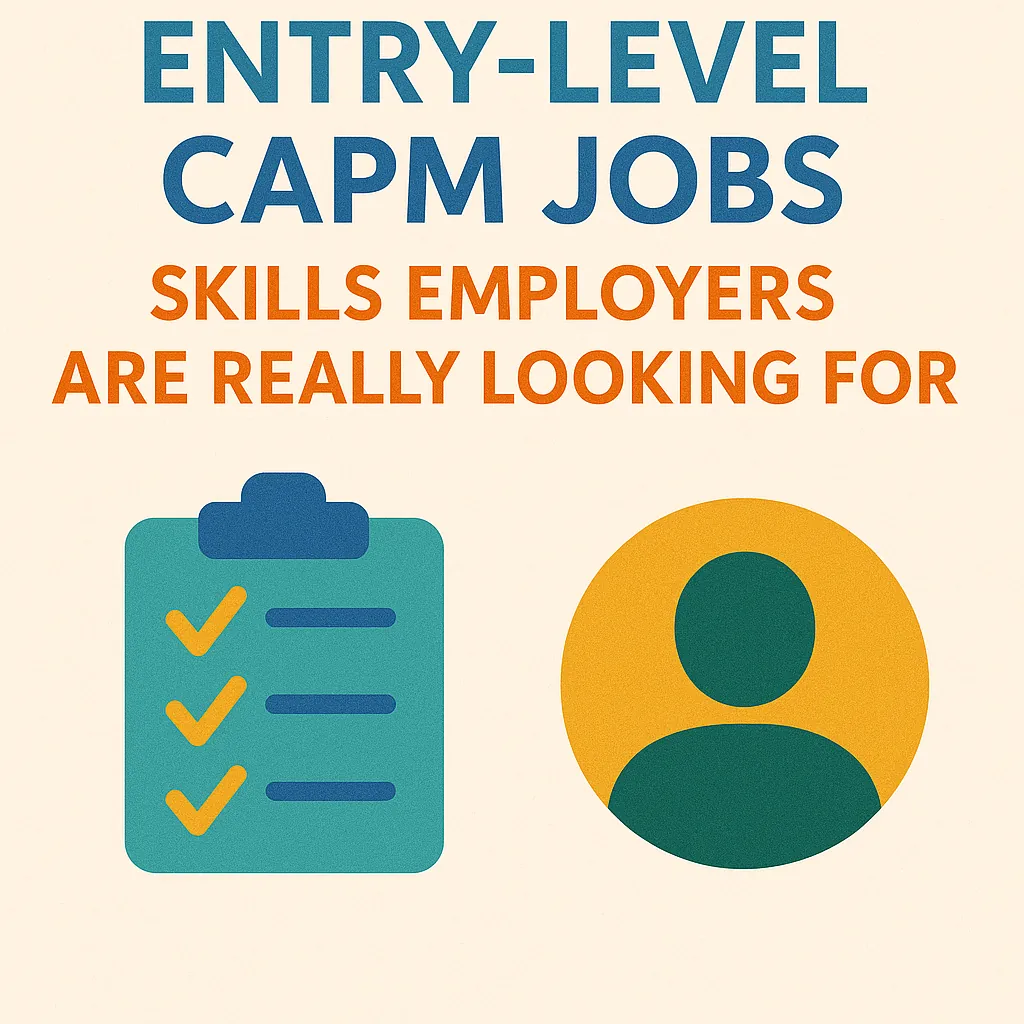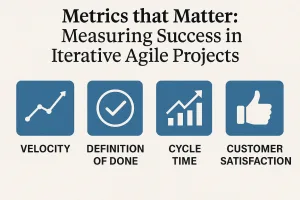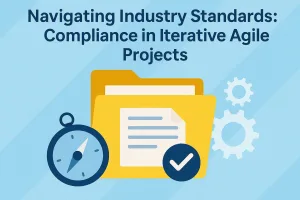Introduction to Entry-Level CAPM Jobs
The Certified Associate in Project Management (CAPM) certification, offered by the Project Management Institute (PMI), serves as a foundational credential for individuals aspiring to enter the field of project management. This entry-level certification is designed for those who wish to demonstrate their understanding of project management principles and practices, making it a valuable asset for job seekers in this competitive landscape. The CAPM certification not only validates a candidate’s knowledge but also enhances their credibility in the eyes of potential employers, signaling a commitment to the profession and a readiness to contribute to project success [2][5].
Entry-level jobs in project management are crucial for career progression. They provide an opportunity for individuals to gain practical experience, develop essential skills, and build a professional network. These positions often serve as stepping stones to more advanced roles, allowing newcomers to learn the ropes of project management while applying their theoretical knowledge in real-world scenarios. As organizations increasingly recognize the importance of effective project management, entry-level roles become vital for cultivating the next generation of project leaders [11][6].
The demand for project management professionals continues to grow across various industries. Companies are actively seeking individuals who possess not only the CAPM certification but also a diverse set of skills that can drive project success. This includes competencies such as communication, problem-solving, and adaptability, which are essential for navigating the complexities of modern projects. As the job market evolves, employers are looking for candidates who can hit the ground running and contribute to their teams from day one [1][3][4].
Understanding the CAPM Certification
The Certified Associate in Project Management (CAPM) certification is a globally recognized credential offered by the Project Management Institute (PMI). It is designed for individuals who are looking to establish a career in project management, particularly those at the entry-level. Here’s a closer look at what the CAPM certification entails and how it can benefit job seekers.
Definition and Purpose of the CAPM Certification
The CAPM certification serves as a foundational credential that validates a candidate’s understanding of project management principles and practices. It is particularly beneficial for those who are new to the field, as it demonstrates a commitment to the profession and a basic grasp of project management concepts. The certification covers essential topics such as project lifecycle, stakeholder management, and risk assessment, equipping candidates with the knowledge needed to contribute effectively to project teams [6][12].
Eligibility Requirements and Examination Details
To be eligible for the CAPM certification, candidates must meet specific educational and experience criteria. The requirements include:
- A secondary degree (high school diploma, associate’s degree, or global equivalent).
- A minimum of 23 hours of project management education completed before the exam.
The examination consists of 150 multiple-choice questions, which candidates must complete within three hours. The questions assess knowledge across various project management domains, ensuring that certified individuals possess a well-rounded understanding of the field [11][15].
Value of CAPM Certification in Enhancing Employability
Earning the CAPM certification can significantly enhance a job seeker’s employability in the competitive project management job market. Here are some key benefits:
- Increased Job Opportunities: The CAPM certification prepares candidates for various entry-level positions, such as project coordinator, junior project manager, and associate project manager. Employers often prefer candidates with certification, as it indicates a level of professionalism and dedication to the field [11][14].
- Skill Validation: The certification not only validates a candidate’s knowledge but also demonstrates their commitment to continuous learning and professional development. This can set candidates apart from others who may not have formal training in project management [10][14].
- Foundation for Advanced Certifications: The CAPM serves as a stepping stone for further certifications, such as the Project Management Professional (PMP). It provides a solid foundation of knowledge that can be built upon as individuals gain experience and seek to advance their careers [12][15].
Core Skills Employers Seek Beyond CAPM Certification
While obtaining the Certified Associate in Project Management (CAPM) certification is a significant step for entry-level job seekers in project management, it is essential to recognize that employers are looking for a broader set of skills that can enhance a candidate’s effectiveness in the role. Here are the critical skills that can help candidates stand out in the competitive job market:
- Communication Skills: Effective communication is paramount in project management, particularly in stakeholder management. Project managers must convey ideas clearly, listen actively, and facilitate discussions among team members and stakeholders. Strong communication skills help in building relationships and ensuring that everyone is aligned with project goals and expectations [10].
- Problem-Solving Skills: The ability to address challenges effectively is crucial in project management. Employers value candidates who can think critically and devise solutions to unforeseen issues that may arise during a project. This skill not only helps in overcoming obstacles but also in maintaining project momentum and ensuring successful outcomes [10].
- Team Collaboration: Working well in diverse teams is essential for project success. Employers seek candidates who can foster a collaborative environment, encouraging input from all team members and leveraging their strengths. Effective collaboration leads to improved creativity and innovation, which are vital in achieving project objectives [10][11].
- Time Management: Prioritizing tasks and meeting deadlines is a fundamental aspect of project management. Employers look for candidates who can efficiently manage their time and resources, ensuring that projects are completed on schedule. Strong time management skills also reflect a candidate’s ability to handle multiple responsibilities and adapt to changing priorities [10][11].
- Adaptability: Flexibility in dynamic project environments is increasingly important. Employers appreciate candidates who can adjust to new challenges, shifting project requirements, and evolving team dynamics. Adaptability not only helps in navigating uncertainties but also demonstrates a candidate’s resilience and willingness to learn [10][11].
Technical Skills for CAPM Job Candidates
When pursuing entry-level positions in project management, particularly for those holding a Certified Associate in Project Management (CAPM) certification, it’s essential to go beyond the certification itself. Employers are increasingly looking for candidates who possess a robust set of technical skills that can enhance their effectiveness in managing projects. Here are some critical technical skills that can significantly boost a candidate’s profile:
- Familiarity with Project Management Software: Proficiency in project management tools such as MS Project, Trello, or Asana is highly valued. These platforms help in planning, executing, and monitoring projects efficiently. Being adept at using these tools can streamline communication and task management within teams, making candidates more attractive to potential employers [6][14].
- Understanding of Agile and Waterfall Methodologies: Knowledge of project management methodologies is crucial. Familiarity with Agile and Waterfall approaches allows candidates to adapt to various project environments and requirements. Agile focuses on iterative progress and flexibility, while Waterfall is more linear and structured. Understanding when to apply each methodology can set candidates apart in a competitive job market [11][15].
- Basic Knowledge of Budgeting and Resource Allocation: Entry-level project managers should have a foundational understanding of budgeting and resource allocation. This includes the ability to create and manage budgets, allocate resources effectively, and understand the financial implications of project decisions. Such skills are essential for ensuring that projects are completed within budget and on time [12][9].
- Data Analysis Skills for Project Reporting: The ability to analyze data and generate reports is increasingly important in project management. Candidates should be comfortable with data analysis tools and techniques to track project performance, identify trends, and make informed decisions. Strong analytical skills can help in presenting project updates and justifying decisions to stakeholders [14][9].
By developing these technical skills, candidates can enhance their employability and demonstrate their readiness to contribute effectively to project management teams. The CAPM certification provides a solid foundation, but these additional skills are what employers are truly seeking in entry-level candidates.
Soft Skills That Make a Difference
In the competitive landscape of project management, particularly for entry-level positions, possessing a CAPM (Certified Associate in Project Management) certification is a valuable asset. However, employers are increasingly recognizing that technical qualifications alone are not sufficient. The following soft skills are critical for aspiring project managers and can significantly enhance their employability:
- Leadership Potential: Even in entry-level roles, demonstrating leadership potential is crucial. Employers seek candidates who can inspire and motivate their teams, even if they are not in formal leadership positions. This includes the ability to take initiative, guide peers, and contribute positively to team dynamics. A proactive attitude can set candidates apart from others who may only focus on their assigned tasks [1][2].
- Emotional Intelligence (EI): Emotional intelligence plays a vital role in managing team dynamics. It involves understanding one’s own emotions and those of others, which is essential for fostering a collaborative work environment. Candidates with high EI can navigate interpersonal relationships effectively, resolve conflicts amicably, and create a supportive atmosphere that enhances team performance [2][3].
- Negotiation Skills: The ability to negotiate is a key soft skill that employers value, especially in project management. Effective negotiation skills are essential for resolving conflicts, reaching agreements, and ensuring that all stakeholders’ needs are met. Entry-level candidates who can demonstrate their capacity to advocate for their ideas while considering others’ perspectives will be more attractive to potential employers [4][5].
- Networking Abilities: Building a professional network is crucial for career advancement in project management. Employers look for candidates who can establish and maintain relationships within and outside their organization. Strong networking skills can lead to mentorship opportunities, collaborations, and access to job openings that may not be publicly advertised. Candidates who actively engage in networking demonstrate their commitment to professional growth and development [6][7].
Gaining Experience and Building a Portfolio
For those pursuing entry-level positions in project management, particularly with a Certified Associate in Project Management (CAPM) certification, it’s essential to recognize that employers are looking for more than just credentials. They seek candidates who can demonstrate practical skills and relevant experience. Here are some effective strategies to gain that experience and build a compelling portfolio:
- Volunteer Opportunities in Project Management Roles: Engaging in volunteer work can provide invaluable experience. Many non-profit organizations and community groups often require project management assistance but may lack the resources to hire professionals. By volunteering, you can take on roles that involve planning, organizing, and executing projects, which will not only enhance your skills but also expand your professional network. This hands-on experience can be a significant asset when applying for jobs, as it showcases your commitment and ability to manage real-world projects [10][11].
- Internships and Co-op Programs as Stepping Stones: Internships and cooperative education (co-op) programs are excellent ways to gain practical experience while still in school. These positions often allow you to work closely with experienced project managers, providing insights into the day-to-day operations of project management. Internships can also lead to full-time job offers upon graduation, making them a strategic move for students looking to enter the field [13][15].
- Importance of Building a Strong Project Portfolio: A well-structured project portfolio is crucial for demonstrating your capabilities to potential employers. This portfolio should include detailed descriptions of projects you have worked on, highlighting your role, the skills you utilized, and the outcomes achieved. Including a variety of projects—whether from internships, volunteer work, or academic settings—can showcase your versatility and depth of experience [9][12].
- Leveraging Academic Projects and Case Studies: Don’t overlook the value of academic projects and case studies. Many educational programs incorporate project management principles into their curriculum, allowing students to work on real or simulated projects. Documenting these experiences and presenting them in your portfolio can illustrate your understanding of project management concepts and your ability to apply them in practical scenarios. This can be particularly beneficial for those who may not have extensive professional experience yet [14][15].
By actively seeking out these opportunities and building a robust portfolio, job seekers can significantly enhance their employability in the competitive field of project management. Employers are increasingly looking for candidates who not only hold a CAPM certification but also possess the practical skills and experiences that demonstrate their readiness to contribute effectively to a team.
Preparing for Interviews in CAPM Roles
Entering the field of project management as a Certified Associate in Project Management (CAPM) can be an exciting opportunity for job seekers and students. However, securing an entry-level position requires more than just holding the certification. Employers are looking for candidates who can effectively demonstrate a range of skills and competencies during the interview process. Here are some key strategies to prepare for interviews in CAPM roles:
Common Interview Questions for Entry-Level Project Management Positions
When preparing for interviews, it’s essential to anticipate the types of questions you may encounter. Common questions for entry-level project management positions often include:
- Tell me about yourself. This question allows you to summarize your background, education, and what led you to pursue a career in project management.
- Describe a time when you faced a challenge in a project. This question assesses your problem-solving abilities and how you handle adversity.
- How do you prioritize tasks in a project? Employers want to know your approach to time management and organization, which are critical in project management roles.
Being prepared with specific examples from your past experiences can help you answer these questions effectively [3][14].
STAR Method for Answering Behavioral Interview Questions
The STAR method is a powerful technique for structuring your responses to behavioral interview questions. STAR stands for:
- Situation: Describe the context within which you performed a task or faced a challenge.
- Task: Explain the actual task or challenge that was involved.
- Action: Detail the specific actions you took to address the task or challenge.
- Result: Share the outcomes of your actions, including any measurable results.
Using this method not only helps you provide clear and concise answers but also allows you to showcase your problem-solving and critical thinking skills [4][9].
Researching the Company and Understanding Its Projects
Before your interview, it’s crucial to conduct thorough research on the company. Understanding its mission, values, and current projects can give you a significant advantage. Here are some tips for effective research:
- Visit the company’s website: Familiarize yourself with their services, recent news, and project portfolios.
- Look for case studies or project highlights: This can provide insight into the types of projects the company undertakes and the skills they value.
- Connect with current or former employees: Platforms like LinkedIn can be useful for gaining insider knowledge about the company culture and expectations.
Demonstrating your knowledge about the company during the interview can impress interviewers and show your genuine interest in the role [10][11].
Demonstrating Soft and Technical Skills During Interviews
In addition to technical knowledge, employers are increasingly valuing soft skills in project management candidates. Here are some essential skills to highlight during your interview:
- Communication: Effective communication is vital in project management. Be prepared to discuss how you have successfully communicated with team members or stakeholders in past projects [8][14].
- Teamwork: Employers look for candidates who can collaborate effectively. Share examples of how you have worked in teams to achieve project goals.
- Leadership: Even in entry-level roles, demonstrating leadership potential can set you apart. Discuss instances where you took initiative or guided others [5][15].
By preparing for common interview questions, utilizing the STAR method, researching the company, and showcasing both soft and technical skills, you can position yourself as a strong candidate for entry-level CAPM roles. This comprehensive approach will not only help you stand out in interviews but also lay a solid foundation for your career in project management.
Conclusion: Your Path to a Successful Project Management Career
As you embark on your journey toward securing an entry-level position in project management, it is essential to recognize that while the Certified Associate in Project Management (CAPM) certification is a valuable asset, it is not the sole determinant of your success. Employers are increasingly looking for candidates who possess a diverse skill set that complements their formal qualifications. Here are some key takeaways to consider:
- Importance of Skills Beyond CAPM Certification: While the CAPM certification demonstrates your foundational knowledge in project management, employers prioritize a range of skills that enhance your effectiveness in the role. Critical soft skills such as leadership, time management, and communication are vital. These abilities enable you to support and guide your team effectively, manage project timelines, and convey information clearly to stakeholders [7][8]. Additionally, technical skills, including proficiency in project management software and data analytics, can set you apart from other candidates [15].
- Encouragement to Continue Learning and Developing Skills: The project management field is dynamic, and continuous learning is crucial. Engaging in professional development through workshops, online courses, and certifications can help you stay updated with industry trends and best practices. This proactive approach not only enhances your resume but also demonstrates your commitment to growth and adaptability, qualities that employers highly value [10][12].
- Final Thoughts on the Value of Persistence in Job Seeking: The path to securing an entry-level project management role may be challenging, but persistence is key. Networking through mentorship, internships, and volunteering can provide valuable insights and connections that may lead to job opportunities [7]. Remember that every application and interview is a learning experience that brings you closer to your goal. Stay motivated, keep refining your skills, and maintain a positive outlook as you navigate the job market.
In summary, while the CAPM certification is an excellent starting point, developing a well-rounded skill set and demonstrating persistence in your job search will significantly enhance your prospects in the competitive field of project management. Embrace the journey, and take proactive steps toward building a successful career.
Find out more about Shaun Stoltz https://www.shaunstoltz.com/about/.
This post was written by an AI and reviewed/edited by a human.



